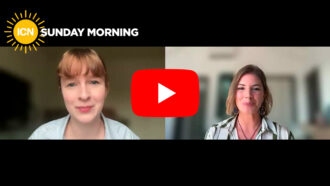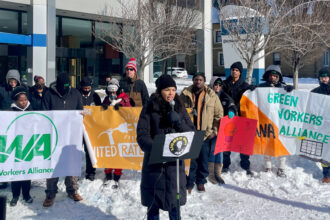RAINELLE, West Virginia—The rain came hard and fast early on the morning of June 23, 2016.

By 2 p.m., water was knee-deep in Bill Bell’s appliance store on Main Street in Rainelle, a small town on the western edge of Greenbrier County, West Virginia.
Bell began elevating the washing machines and dishwashers, thinking that would be enough. But within hours, he’d lose it all. Today, his shop is up and running once again, but the memory of the flood runs deep.
“To be honest with you, everybody here sleeps on pins and needles when it calls for a big rain,” he says.
West Virginia is one of the most flood-prone states in the country. With climate change, those flood risks could worsen with a future of more intense and variable weather. Yet it’s hard for state officials charged with protecting the public to even talk about climate change, the Ohio Valley ReSource and West Virginia Public Broadcasting found as part of a regional collaboration with InsideClimate News called “Caught Off Guard: Southeast Struggles with Climate Change.”
This story was published as part of a collaborative project organized by InsideClimate News involving nine newsrooms across seven states. The project was led by Louisville, KY-based James Bruggers of InsideClimate News, who leads the Southeast regional hub of ICN’s Environment Reporting Network.
About This Story
Perhaps you noticed: This story, like all the news we publish, is free to read. That’s because Inside Climate News is a 501c3 nonprofit organization. We do not charge a subscription fee, lock our news behind a paywall, or clutter our website with ads. We make our news on climate and the environment freely available to you and anyone who wants it.
That’s not all. We also share our news for free with scores of other media organizations around the country. Many of them can’t afford to do environmental journalism of their own. We’ve built bureaus from coast to coast to report local stories, collaborate with local newsrooms and co-publish articles so that this vital work is shared as widely as possible.
Two of us launched ICN in 2007. Six years later we earned a Pulitzer Prize for National Reporting, and now we run the oldest and largest dedicated climate newsroom in the nation. We tell the story in all its complexity. We hold polluters accountable. We expose environmental injustice. We debunk misinformation. We scrutinize solutions and inspire action.
Donations from readers like you fund every aspect of what we do. If you don’t already, will you support our ongoing work, our reporting on the biggest crisis facing our planet, and help us reach even more readers in more places?
Please take a moment to make a tax-deductible donation. Every one of them makes a difference.
Thank you,












